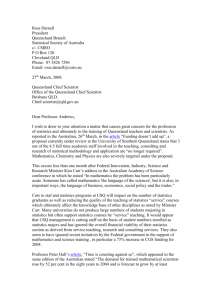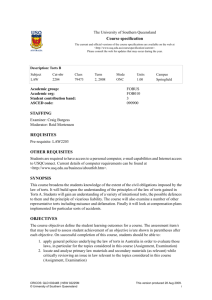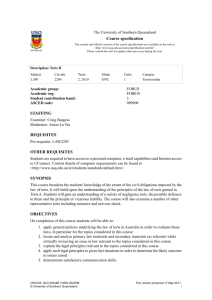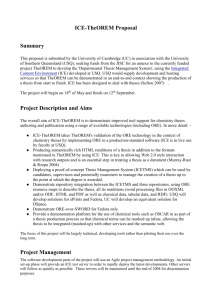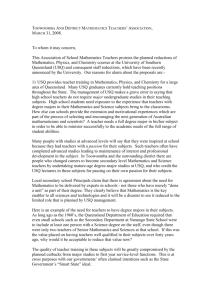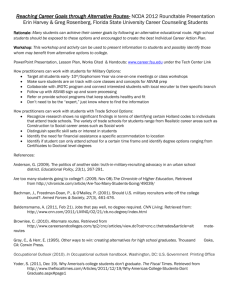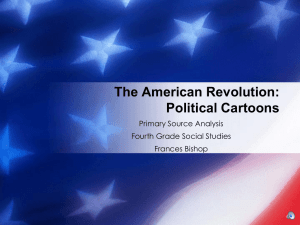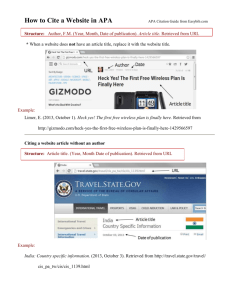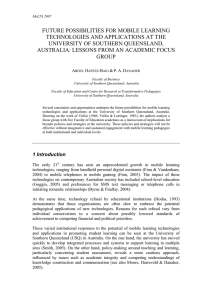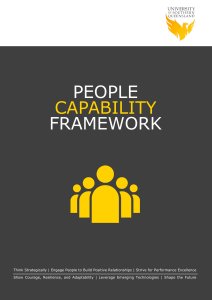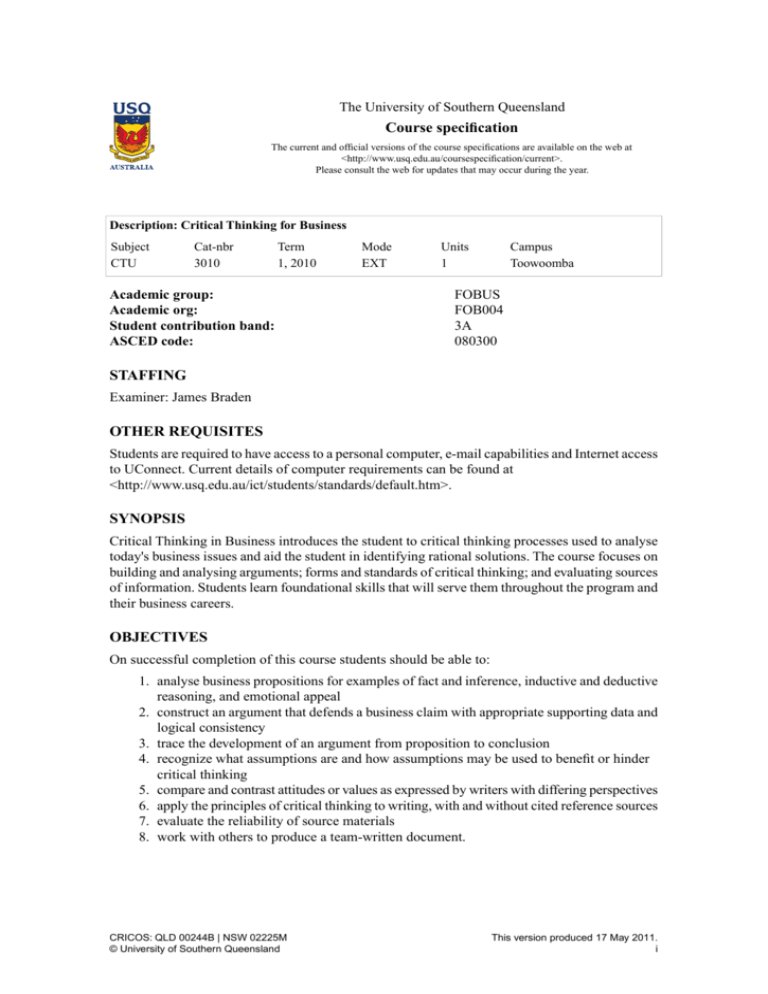
The University of Southern Queensland
Course specification
The current and official versions of the course specifications are available on the web at
<http://www.usq.edu.au/coursespecification/current>.
Please consult the web for updates that may occur during the year.
Description: Critical Thinking for Business
Subject
CTU
Cat-nbr
3010
Term
1, 2010
Academic group:
Academic org:
Student contribution band:
ASCED code:
Mode
EXT
Units
1
Campus
Toowoomba
FOBUS
FOB004
3A
080300
STAFFING
Examiner: James Braden
OTHER REQUISITES
Students are required to have access to a personal computer, e-mail capabilities and Internet access
to UConnect. Current details of computer requirements can be found at
<http://www.usq.edu.au/ict/students/standards/default.htm>.
SYNOPSIS
Critical Thinking in Business introduces the student to critical thinking processes used to analyse
today's business issues and aid the student in identifying rational solutions. The course focuses on
building and analysing arguments; forms and standards of critical thinking; and evaluating sources
of information. Students learn foundational skills that will serve them throughout the program and
their business careers.
OBJECTIVES
On successful completion of this course students should be able to:
1. analyse business propositions for examples of fact and inference, inductive and deductive
reasoning, and emotional appeal
2. construct an argument that defends a business claim with appropriate supporting data and
logical consistency
3. trace the development of an argument from proposition to conclusion
4. recognize what assumptions are and how assumptions may be used to benefit or hinder
critical thinking
5. compare and contrast attitudes or values as expressed by writers with differing perspectives
6. apply the principles of critical thinking to writing, with and without cited reference sources
7. evaluate the reliability of source materials
8. work with others to produce a team-written document.
CRICOS: QLD 00244B | NSW 02225M
© University of Southern Queensland
This version produced 17 May 2011.
i
TOPICS
Description
Weighting (%)
1.
Observation skills
10.00
2.
Word precision
10.00
3.
Facts: what's real?
10.00
4.
Inferences: what follows?
10.00
5.
Assumptions: what's taken for granted
10.00
6.
Opinions: what's believed?
10.00
7.
Viewpoints: what's the filter?
10.00
8.
Argument: what's a good argument?
10.00
9.
Fallacies: what's a faulty argument?
10.00
10.
Inductive and deductive reasoning
10.00
TEXT and MATERIALS required to be PURCHASED or ACCESSED
ALL textbooks and materials are available for purchase from USQ BOOKSHOP (unless otherwise
stated). Orders may be placed via secure internet, free fax 1800642453, phone 07 46312742 (within
Australia), or mail. Overseas students should fax +61 7 46311743, or phone +61 7 46312742. For
costs, further details, and internet ordering, use the 'Textbook Search' facility at
http://bookshop.usq.edu.au click 'Semester', then enter your 'Course Code' (no spaces).
Mayfield, M2010, Thinking for yourself: developing critical thinking skills through reading and
writing, 8th edn, Cengage Learning, Boston, Massachusetts.
Nosich, GM2009, Learning to think things through: a guide to critical thinking across the
curriculum, 3rd edn, Pearson Prentice Hall, Upper Saddle River, New Jersey.
REFERENCE MATERIALS
Reference materials are materials that, if accessed by students, may improve their knowledge and
understanding of the material in the course and enrich their learning experience.
(Archie, L & Archie, JG 2004, Reading for philosophical inquiry: a brief introduction to
philosophical thinking, An open source reader (Version. 0.21). Retrieved from
<http://philosophy.lander.edu/intro/introbook-links.html>)
(EconomicExpert.com (2008). Retrieved from <http://www.economicexpert.com/a/Satire.html>)
(Foundation for Critical Thinking (2008). Criticalthinking.org: Library/Articles. Retrieved from
<http://www.criticalthinking.org/articles/index.cfm>)
(Kemerling, G (1997-2006). Logic. Retrieved from
<http://www.philosophypages.com/lg/index.htm>)
(Kies, D (1995-2008). Underlying assumptions. Retrieved from
<http://papyr.com/hypertextbooks/comp2/assume.htm>)
CRICOS: QLD 00244B | NSW 02225M
© University of Southern Queensland
This version produced 17 May 2011.
ii
(Michalos, AC (1986). Informal fallacies. Retrieved from
<http://partners.is.asu.edu/~george/mco494/fallacies.html>)
(Nizkor Project (1991-2008). Fallacies. Retrieved from
<http://www1.ca.nizkor.org/features/fallacies/index.html>)
(OWL at Purdue (1995-2008). Logic in argumentative writing. Retrieved from
<http://owl.english.purdue.edu/owl/resource/659/01>)
(Please be aware that Web addresses may change from time to time. Consult your examiner if you
have questions about electronic resources.)
(Spiritus-Temporis.com (2005). Satire: notable examples of satire. Retrieved from
<http://www.spiritus-temporis.com/satire/notable-examples-of-satire.html>)
(The publisher of your text has provided a companion website at
<http://www.heinle.com/cgi-wadsworth/course_products_wp.pl?fid=M20b&flag=student&product_isbn_issn=9781428231443&disciplinenumber=307>)
(University of California Berkeley Career Center (1998-2008). Job search tools. Retrieved from
<http://career.berkeley.edu/Tools/Tools.stm>)
Browne, MN2004, Asking the right questions: a guide to critical thinking, 7th edn, Pearson/Prentice
Hall, Upper Saddle River, New Jersey.
Lakhani, D2006, The power of an hour: business and life mastery in one hour a week, John Wiley,
Hoboken, New Jersey.
(chapter 3 - How to think critically)
Paul, R2006, Critical thinking: tools for taking charge of your learning and your life, 2nd edn,
Pearson/Prentice Hall, Upper Saddle River, New Jersey.
Sloan, J2006, Learning to think strategically, Elsevier/Butterworth-Heinemann, Amsterdam.
STUDENT WORKLOAD REQUIREMENTS
ACTIVITY
HOURS
Assessments
20.00
Directed Study
52.00
Private Study
93.00
CRICOS: QLD 00244B | NSW 02225M
© University of Southern Queensland
This version produced 17 May 2011.
iii
ASSESSMENT DETAILS
Description
Marks
out of
Wtg
(%)
PARTICIPATION
10
10
JOURNAL EXERCISES
20
INFERENCE ESSAY
Due date
Objectives
assessed
Graduate
skill
Level
assessed
04 Mar 2010 All
U1, U2,
U4, U6
2, 2, 2, 2
20
04 Mar 2010 All
U2, U3,
U7, U9
2, 2, 2, 2
10
10
25 Mar 2010 All
U1, U2,
U4
2, 2, 2
ONLINE DISCUSSIONS 10
10
04 Apr 2010 All
U3, U5,
U6
2, 2, 2
VIEWPOINTS
COMPARISON
15
15
04 May 2010 All
U1, U2,
U4
2, 2, 2
EDITORIAL
EVALUATION
15
15
25 May 2010 All
U1, U2,
U4
2, 2, 2
ARGUMENTATIVE
ESSAY
20
20
15 Jun 2010 All
U1, U2,
U4
2, 2, 2
GRADUATE QUALITIES AND SKILLS
Elements of the following USQ Graduate Skills are associated with the successful completion of
this course.
Ethical Research & Enquiry (Skill U1)
Intermediate (Level 2 )
Problem Solving (Skill U2)
Intermediate (Level 2 )
Academic, professional and digital literacy (Skill Intermediate (Level 2 )
U3)
Written & Oral Communication (Skill U4)
Intermediate (Level 2 )
Interpersonal Skills (Skill U5)
Intermediate (Level 2 )
Teamwork (Skill U6)
Intermediate (Level 2 )
Cultural Literacy (Skill U7)
Intermediate (Level 2 )
Creatvty, Initiative & Entrprse (Skill U9)
Intermediate (Level 2 )
IMPORTANT ASSESSMENT INFORMATION
1 Attendance requirements:
If you are an international student in Australia, you are advised to attend all classes at
your campus. For all other students, there are no attendance requirements for this course.
However, it is the students' responsibility to study all material provided to them or required
to be accessed by them to maximise their chance of meeting the objectives of the course
and to be informed of course-related activities and administration.
2 Requirements for students to complete each assessment item satisfactorily:
To satisfactorily complete an individual assessment item a student must achieve at least
50% of the marks. (Depending upon the requirements in Statement 4 below, students may
CRICOS: QLD 00244B | NSW 02225M
© University of Southern Queensland
This version produced 17 May 2011.
iv
3
4
5
6
7
8
not have to satisfactorily complete each assessment item to receive a passing grade in this
course.)
Penalties for late submission of required work:
If students submit assignments after the due date without prior approval of the examiner,
then a penalty of 5% of the total marks gained by the student for the assignment may apply
for each working day late up to ten working days at which time a mark of zero may be
recorded.
Requirements for student to be awarded a passing grade in the course:
To be assured of receiving a passing grade a student must achieve at least 50% of the total
weighted marks available for the course.
Method used to combine assessment results to attain final grade:
The final grades for students will be assigned on the basis of the aggregate of the weighted
marks obtained for each of the summative assessment items in the course.
Examination information:
There is no examination in this course.
Examination period when Deferred/Supplementary examinations will be held:
Not applicable.
University Regulations:
Students should read USQ Regulations 5.1 Definitions, 5.6 Assessment, and 5.10 Student
Academic Misconduct for further information and to avoid actions which might contravene
university regulations. These regulations can be found at
<http://www.usq.edu.au/corporateservices/calendar/part5.htm>. Students should also read
the Faculty of Business Procedures which can be found at
<http://www.usq.edu.au/business/aboutfob.htm>.
ASSESSMENT NOTES
1 (i) The due date for an assignment is the date by which a student must submit the
assignment to the USQ. (ii) Students must retain a copy of each assignment submitted for
assessment. This must be produced within 24 hours if required by the examiner. (iii) In
accordance with university policy, the examiner may grant an extension of the due date
of an assignment in extenuating circumstances. (iv) In the event that a due date for an
assignment falls on a local public holiday in their area, such as a show holiday, the due
date for the assignment will be the next day. Students are to note on the assignment cover
the date of the public holiday for the examiner's convenience.
2 Harvard (AGPS) is the referencing system required in this course. Students should use
Harvard (AGPS) style in their assignments to format details of the information sources
they have cited in their work. The Harvard (AGPS) style to be used is defined by the USQ
Library's referencing guide at
<http://www.usq.edu.au/library/help/referencing/default.htm>.
OTHER REQUIREMENTS
1
Computer, e-mail and Internet access: Students are required to have access to a personal
computer, e-mail capabilities and Internet access to UConnect. Current details of computer
requirements can be found at <http://www.usq.edu.au/ict/students/standards/default.htm>.
CRICOS: QLD 00244B | NSW 02225M
© University of Southern Queensland
This version produced 17 May 2011.
v

